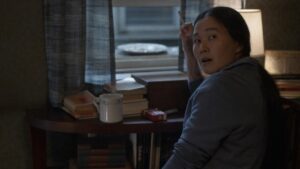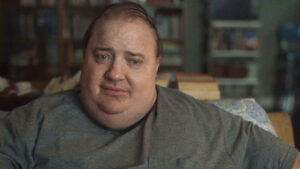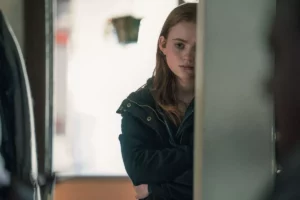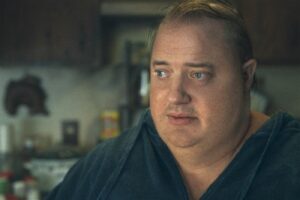Publication Date: 02-01-2023
The Whale (2022) review
Dir. Darren Aronofsky
By: Steve Pulaski
Rating: ★★
When watching The Whale, my mind kept going back to what Roger Ebert said when reviewing Wolf Creek of all movies: “here’s a movie that filled me with sadness and loathing.”
I didn’t downright hate The Whale, but I found several aspects of it cruel to an unbearable degree — worse when Aronofsky not merely tried to cast a glow of empathy on Brendan Fraser’s Charlie, but underscored the reasons for his plight with heavy telegraphing and emotional manipulation.
The Whale is based on Samuel D. Hunter’s play of the same name; Hunter is the lone screenwriter of the adaptation. Set entirely in a dingy, dimly lit apartment in Idaho, the film revolves around Charlie, a 600-pound recluse who teaches online college writing courses with his webcam off, so his students don’t see what he looks like. Our introduction to Charlie is him masturbating to gay porn so violently, he nearly gives himself a heart attack. A clueless missionary named Thomas (Ty Simpkins) happens to wander through the door when this is happening, in search of a soul to save. Charlie implores him not to call 911, but instead read one of his students’ essays: a brutally honest bashing of Moby Dick, one only an apathetic teenager could write.

By the time his in-home caretaker, Liz (Hong Chau), arrives, Charlie has mostly recovered, but a look at his blood pressure shows that he is experiencing congestive heart failure and will be dead soon without a trip to the hospital. This realization compels Charlie not to go to the ER, but instead, attempt to reconcile with Ellie (Sadie Sink), his teenaged daughter he hasn’t seen in nearly a decade. Ellie loathes her father, disgusted by his current appearance and even more sickened by the fact he left her and her mother, Mary (Samantha Morton), to be with his gay lover.
Visits from Liz, Ellie, and Thomas interrupt Charlie’s loneliness enough to give him some form of human contact. For the most part, however, he wallows on the couch, needing a walker for transport and to get up off the couch, where he spends most of his days.
Charlie has a big heart. He’s deeply sentimental and caring, often encouraging his students to write something honest as opposed to the typical college pablum they know will get them high marks. But when it comes to his own health and wellbeing, he’s entirely dismissive. He has selfless intentions for others, but a complete lack of resolve for himself. Brendan Fraser finds the humanity in Charlie even when director Darren Aronofsky doesn’t. Fraser might not be incredibly mobile in this role — especially buried under a gargantuan fat-suit — but he does some of his finest acting, particularly with his weepy eyes. It’s good to have him back.
That said, Hong Chau is every bit his equal, stern like a mother to whom we can assume is one of her few friends as well. Sadie Sink is impressive, bringing a sullenness to her role that not only matches the film’s tone but serves as the fuel for her contentious rapport with her dad. Ty Simpkins is serviceable, but his Thomas is the odd-character out. His introduction is contrived, and it makes no sense why Charlie, Liz, or anyone else would continue to let him in the apartment day-after-day.

Unlike my mother, I could never watch shows like My 600-Lb. Life. I find them to be the lowest of the low in the realm of reality TV; they make whatever the hell the Kardashians are doing any given week look like an Orson Welles movie by comparison. I remain disgusted by their exploitative qualities. Having said that, I grappled with how I felt Charlie was portrayed here for a large portion of the film. For much of The Whale, I found Aronofsky’s approach to be akin to shock value. He obsessively lingers on Charlie’s inability to do anything without a struggle, be it completely destroying an end-table trying to get up off the couch, wolfing down candy bars while reading about congestive heart failure, or nearly choking to death when devouring a meatball sub-sandwich.
The latter scene still disturbs me whenever I think about it: Liz frantically whacking Charlie’s back until he chokes up the food, and then violently hitting and accosting him for not chewing the food in the first place. I can indulge in some gory, grisly horror movies, but I learned scenes such as that one, and later, the sequence where Charlie binge-eats uncontrollably, rattle me to my core on a human level.
There’s nothing inherently wrong with these moments. For one, Aronofsky offers something of a window into a way of life few of us know or even ponder. It’s the way the scenes are presented that render them cruel. Charlie can’t even indulge in a hearty laugh without nearly coughing and wheezing himself to death. His repeated declaration of “I’m sorry” to Liz and his daughter Ellie evoke shame more than empathy. Aronofsky affords him little opportunity to exist comfortably long enough to be seen as anything more than a circus-act, writhing in pain, practically begging to be put to pasture.

The production — which is very loyal to that of a stage-play — doesn’t assist in making this film the least bit subtle either. Hunter’s script leans on the story of Moby Dick, as well as the essay Charlie continues to reread, as a crutch to spell out larger themes of guilt (which A24 should trademark by now), finding contentment in life, and tying in the film’s aquatic symbolism. Rob Simonsen’s score tells us exactly how to feel with each scene. Most impressive is Matthew Libatique’s cinematography, making the most out of the squalor conditions of Charlie’s apartment. The choice to shoot this movie in 1:33:1 aspect ratio also gives the feeling of claustrophobia.
The Whale was one of the most upsetting movie experiences for me in recent memory — which isn’t nothing, as it reminds even someone like me, who sees hundreds of films a year, the power of this medium. Not terribly surprising it comes from Aronofsky (mother!, Requiem for a Dream), given the director’s repertoire of films is predicated on delivering characters and scenes you’ve never seen before and probably won’t again, at least for a very long time. But too frequently did his latest try to pass cruelty for empathy and telegraphing for pacing to come close to matching the composure of its cast. This is a film failed by its approach, no matter how long it stays with you after it concludes.
NOTE: Also, did anyone else notice another character here inexplicably being from Waterloo, Iowa of all places? Not even three months ago, Chef Julian Slowik in The Menu claimed Waterloo was his hometown as well. Both films starred Hong Chau too, oddly enough. I found it interesting enough to write about, if you care to indulge.
Starring: Brendan Fraser, Sadie Sink, Hong Chau, Ty Simpkins, Samantha Morton, Sathya Sridharan, and Jacey Sink. Directed by: Darren Aronofsky.
About Steve Pulaski
Steve Pulaski has been reviewing movies since 2009 for a barrage of different outlets. He graduated North Central College in 2018 and currently works as an on-air radio personality. He also hosts a weekly movie podcast called "Sleepless with Steve," dedicated to film and the film industry, on his YouTube channel. In addition to writing, he's a die-hard Chicago Bears fan and has two cats, appropriately named Siskel and Ebert!


